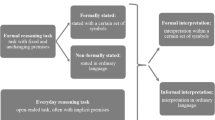Abstract
The author deals with the operational core oflogic, i.e. its diverse procedures ofinference, in order to show that logicallyfalse inferences may in fact be right because –in contrast to logical rationality – theyactually enlarge our knowledge of the world.This does not only mean that logically trueinferences say nothing about the world, butalso that all our inferences are inventedhypotheses the adequacy of which cannot beproved within logic but only pragmatically. Inconclusion the author demonstrates, through therelationship between rule-following andrationality, that it is most irrational to wantto exclude the irrational: it may, at times, bemost rational to think and infer irrationally.
Focussing on the operational aspects of knowingas inferring does away with the hiatus betweenlogic and life, cognition and the world(reality) – or whatever other dualism one wantsto invoke –: knowing means inferring, inferringmeans rule-governed interpreting, interpretingis a constructive, synthetic act, and aconstruction that proves adequate (viable) inthe ``world of experience'', in life, in thepraxis of living, is, to the constructivistmind, knowledge. It is the practice of livingwhich provides the orienting standards forconstructivist thinking and its judgments ofviability. The question of truth is replaced bythe question of viability, and viabilitydepends on the (right) kind of experiential fit.
Similar content being viewed by others
REFERENCES
Apel, K.-O.: 1975, Der Denkweg von Charles Sanders Peirce. Eine Einführung in den amerikanischen Pragmatismus. Frankfurt/Main, Suhrkamp.
Bühler, K.E. and H.R. Fischer: 1984, Regelbegriff und Rationalität. In Ästhetik, Akten des Internationalen Wittgenstein-Symposiums 1983. Hrsg. von Rudolf Haller,Wien, Hölder-Pichler-Temsky, S. 246–249.
Diels, H.: 1989, Die Fragmente der Vorsokratiker. 3 Bände. Herausgegeben von Walther Kranz. Unveränderter Nachdruck der 6. Aufl. 1951. Zürich, Weidman.
Eco, U.: 1985, Semiotik und Philosophie der Sprache. München, Fink.
Eco, U. and T.A. Sebeok (Hrsg): 1985, Der Zirkel oder Im Zeichen der Drei. Dupin, Holmes, Peirce. München, Fink.
Fischer, H.R.: 1987, Sprache und Lebensform. Wittgenstein über Freud und die Geisteskrankheit. Monographien zur philosophischen Forschung. Bd. 242, Athenäum. Frankfurt 1987. 2. verbesserteAuflage 1991,Heidelberg, Carl-Auer.
Fischer, H.R.: 1990b, Madness and Method. In Ludwig Wittgenstein. A Reevaluation. Proceedings of the Intern.
Wittgenstein-Symposium: 1989, Ed. by Rudolf Haller. Hölder-Pichler-Tempsky, Wien 1990.
Fischer, H.R.: 1994, Is There any Logic in Madness? Linguistic Reflections on an Interpersonal Theory of Mental Illness. In Wittgenstein Studien 1/94, 10-1-94. Springer.
Fischer, H.R.: 1999a, Rationalität als offene Ordnung. Zur Logik und Evolution neuer Sprachspiele. In H.J. Schneider and M. Kroß (eds.), Mit Sprache spielen. Die Ordnungen und das Offene nach Wittgenstein. Berlin: Akademie Verlag, S. 149–168.
Fischer, H.R.: 1999b, Rationalität, Logik undWirklichkeit. Zu einem konstruktivistischen Verständnis der Logik. In Wissen und Erfahrung, Festschrift für Ernst von Glasersfeld. Hrsg. von Gebhard Rusch, Heidelberg, Carl-Auer-Systeme, S. 35–53.
Fischer, H.R.: 2000, Rationalität zwischen logischem und paralogischemDenken. In H.R. Fischer und S.J. Schmidt (eds.), Wirklichkeit und Welterzeugung. In memoriam Nelson Goodman. Heidelberg: Carl-Auer-Systeme.
von Hayek, F.A.: 1980, Recht, Gesetzgebung und Freiheit, 3 Bände, Band 1, Regeln und Ordnung: e. neueste Darstellung des liberalen Prinzipien der Gerechtigkeit und der politischen Ökonomie,München, Verlag Moderne Industrie.
Keller, R.: 1990, Sprachwandel. Von der unsichtbaren Hand in der Sprache. Tübingen und Basel, FranckeVerlag.
Keller, R.: 1995, Zeichentheorie: zu einer Theorie semiotischenWissens. Francke: Tübingen, Basel.
Peirce, C.S.: 1931-1935, 1958, Collected Papers of Charles Sanders Peirce. Bd. I-VI (1931-34) ed by Ch. Hartshorne and P. Weiss. Vol. VII-VIII (1958) ed. By A.W. Burks. Cambridge, Massachusetts/London. Abbv. as CP + Volume + page.
Peirce, C.S.: 1975, Charles Sanders Peirce: Contributions to The Nation. Parte One: 1869-1893.Compiled and Annotated by Kenneth Laine Ketner and James Edward Cook. Lubbock, Texas: Texas Tech Press.
Peirce, C.S.: 1982-1993,Writings of Charles S. Peirce. A chronological Edition. Ed. By M.H. Fisch et al. Vol I-V. Abbr. as W (plus Volume). Bloomington: Indiana University Press.
Peirce, C.S.: 1983, Phänomen und Logik der Zeichen. Hrsg. und übersetzt von Helmut Pape, Frankfurt/Main, Suhrkamp.
Peirce, C.S.: 1991a, Naturordnung und Zeichenprozeß. Schriften über Semiotik und Naturphilosophie. Hrsg. und eingeleitet von Helmut Pape. Frankfurt/Main, Suhrkamp.
Peirce, C.S.: 1991b, Schriften zum Pragmatismus und Pragmatizismus, hrsg. von Karl-Otto Apel, Frankfurt/Main, Suhrkamp.
Peirce, C.S.: 1986, Semiotische Schriften Bd. 1-3, hrsg. und übersetzt von Christian Kloesel und Helmut Pape, Frankfurt/Main 1986, Bd 2 1990, Bd. 3 1993, Suhrkamp. Abbv. as SS + Volume + page.
Richter, A.: 1995, Der Begriff der Abduktion bei Charles Sanders Peirce. Frankfurt/Main. Berlin, New York, Paris, Wien. Peter Lang.
Riemer, I.: 1988, Konzeption und Begründung der Induktion. Eine Untersuchung zur Methodologie von Charles S. Peirce. Würzburg, Königshausen und Neumann.
Schönrich, G.: 1990, Zeichenhandeln. Untersuchungen zum Begriff einer semiotischen Vernunft im Ausgang von Ch.S. Peirce. Frankfurt/Main, Suhrkamp.
Sebeok, T.A. und J. Umiker-Sebeok: 1985, “Sie kennen ja meine Methode” ein Vergleich von Charles S. Peirce und Sherlock Holmes. In: Eco u. Sebeok (1985), S. 28–87. München, Fink. Ñberarbeitete Version von Sebeok 1982.
Wittgenstein, L.: 1953, Philosophical Investigations, translated by G.E.M. Anscombe. Oxford: Basil Blackwell.
Wittgenstein, L.: 1956, Remarks on the Foundations of Mathematics. Edited by G.H. von Wright, R. Rhees and G.E.M. Anscombe (eds.). Oxford: Basil Blackwell (RFM).
Wittgenstein, L. 1977, Vermischte Bemerkungen. Frankfurt/Main, Suhrkamp.
Wittgenstein, L.: 1980, Lectures, Cambridge 1932-1935. Vol. 1 and 2. Oxford: Basil Blackwell. Abbv. as Volume + page.
Whitehead, A.N.: 1978, Process and Reality. An Essay in Cosmology. New York/London: The Free Press.
Wright, von G.H.: 1963, Norm und Handlung. Eine logische Untersuchung. Köngstein (Scriptor).
Wright von, G.H.: 1984, Erklären und Verstehen, Königstein 1984, 2. Aufl., Athenäum.
Author information
Authors and Affiliations
Rights and permissions
About this article
Cite this article
Fischer, H.R. Abductive Reasoning as a Way of Worldmaking. Foundations of Science 6, 361–383 (2001). https://doi.org/10.1023/A:1011671106610
Issue Date:
DOI: https://doi.org/10.1023/A:1011671106610




